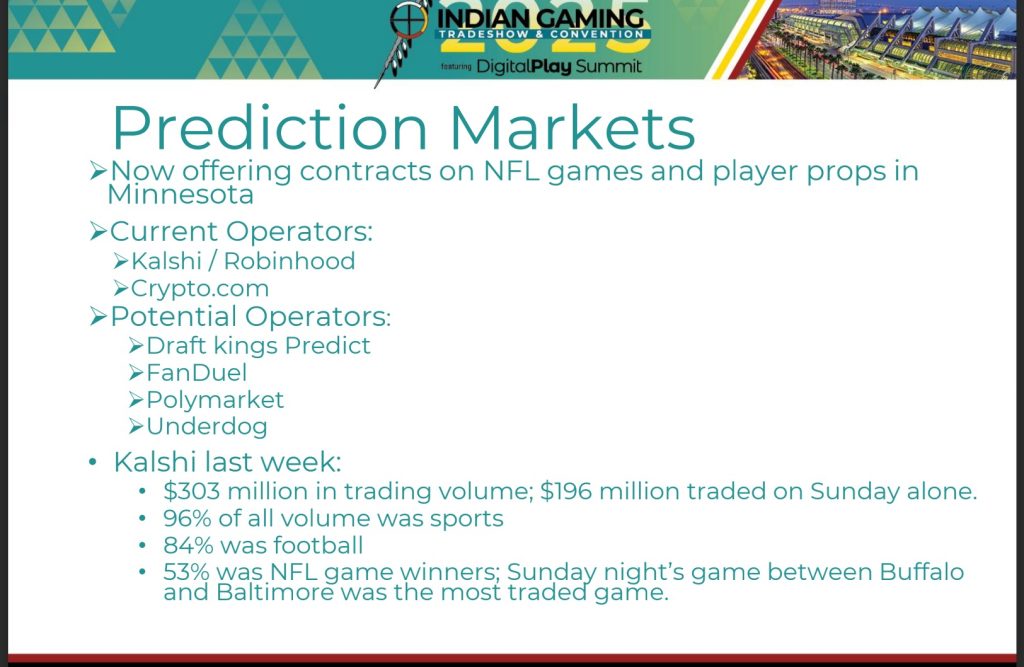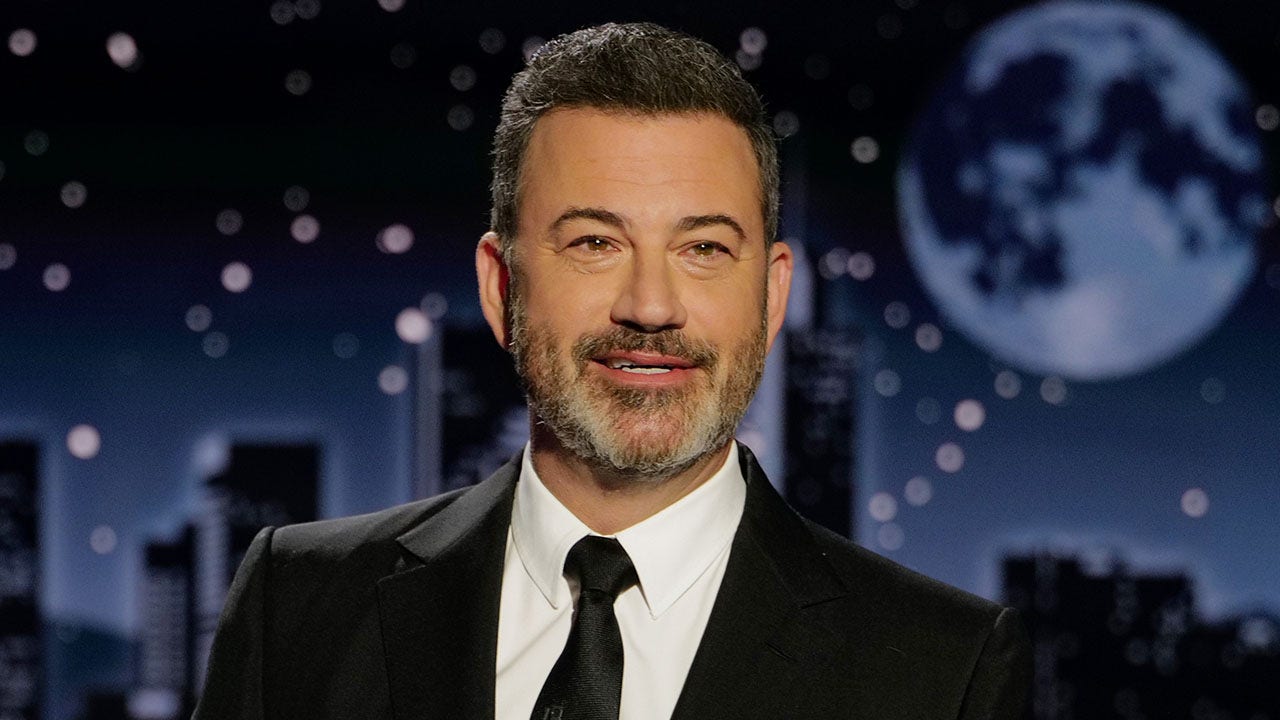PRIOR LAKE, Minn. — Any number of cliches have been used to describe what prediction markets are to sports betting. The two that came up at the Indian Gaming Association (IGA) Mid-Year Conference Sept. 9 were “a rose by any other name” and “if it walks like a duck, quacks like a duck, then it’s … sports betting.”
There’s no question that prediction markets have disrupted the legal sports betting landscape — Kalshi began offering election markets late last fall after prevailing in D.C. Circuit Court, and since then has pushed sports event contracts on its own and in partnership with Robinhood. PredictIt has launched in the U.S., Underdog has partnered with Crypto.com (after Crypto.com went first into sports in late 2024) to go live with sports-related markets, Polymarket has plans to launch in the U.S., and sports betting market leader FanDuel announced a deal with derivatives marketplace CME.
But questions continue to arise: Do prediction markets offer sports betting, or something else? If the answer is sports betting, then why aren’t prediction markets beholden to the same sorts of consumer protections as state-licensed operators? And how will prediction markets ultimately fit into the U.S. wagering landscape? Maybe not seamlessly, if the response just this week from Arizona’s sports wagering regulators is any indication.
The question is not unique to Minnesota, where tribal retail casinos and parimutuel wagering are legal, but wagering is not. Consultant Gene Johnson’s presentation during “The Minnesota Market: Mapping the Sports Betting Landscape” included a list of 10 unregulated or prediction markets that are already without state regulation in Minnesota. Johnson, SVP for Victor Strategies, which specializes in tribal gaming, also shared that for the first week of the NFL season, Kalshi reported $303 million in trading volume, 96% of which came from sports. Minnesota has a population of more than 5.5 million, and rabid Minnesota Vikings fans throughout.
Though sports betting is not yet legal, it’s likely that millions, if not tens of millions of Kalshi’s volume came out of Minnesota, and potentially will cut into future tribal gaming revenue.

Gaming surges often result in scandal
Jim Klas, Principal with KlasRobinson Q.E.D., a tribal gaming consultancy, said he expects prediction markets — and unregulated gambling products — to ultimately collapse on themselves.
“Every gaming surge we’ve ever had grows rapidly and then eventually gets killed because of a massive cheating scandal,” he said. “The industry and tribes have shown they can regulate themselves, but the further away from that you get, the more likely it is to have a scandal and it’s bad for everyone.”
Minnesota lawmakers have plans to try to legalize in-person and digital sports betting during the 2026 session. The legislature has taken up the issue multiple times, and has run into political disagreements, pushback from the anti-gambling lobby, and more. That’s in addition to negotiating a deal that the state’s gaming tribes, racetracks, and charitable gambling groups will support.
As time has moved on, new issues have arisen. Since last fall, tribes and the commercial industry have been engaged in fights against unregulated sweepstakes and prediction markets, which are now available throughout the U.S. Regulated by the Commodity Futures Trading Commission (CFTC), prediction markets are not currently beholden to the same stringent regulations as state-regulated sports betting and gambling operators, and they do not pay taxes to individual states.
"The nine tribal members of the Minnesota Indian Gaming Association (MIGA) have said they will support sports betting only if they maintain exclusivity…"
Hopes for legalized sports betting in Minnesota appear dashed again over tribes-tracks conflict https://t.co/Xyein2GSa1
Brendan Bussmann, Principal at Las Vegas-based gambling consultancy B Global, said that without these safeguards, scandals are bound to arise. And there is hard proof that since the Professional and Amateur Sports Protection Act (PASPA) was overturned in 2018, the legal market is capable of identifying and limiting abuse.
“Every time there has been a scandal in sport betting, it’s been the operators who identified it,” Bussmann said. “You’re never going to know if there is going to be a scandal [with an unregulated operator]. Kalshi — they just took a line off and no one heard anything about that. There are no checks and balances for Fliff, Kalshi, or others. It goes back to the idea that the scandals are found by the regulated market which wants to protect itself.”
Two of the biggest wagering scandals since PASPA made sports betting a states’ rights issue, were identified by sportsbooks in conjunction with integrity monitoring services. Last year, according to court records, DraftKings and FanDuel flagged unusual betting acitivty on former NBA player Jontay Porter, who now awaits sentencing for match fixing. In 2023, staff at the BetMGM retail sportsbook at Great American Ballpark immediately reported tens of thousands of dollars in bets on Alabama baseball. In addition, BetMGM surveillance camera captured texts between a bettor and Alabama baseball Coach Brad Bohanan discussing the best. Bohanan was fired from Alabama and banned from coaching college baseball for 15 years.
In the end, it’s all about the spin
While the regulated market takes care of its own, it must also, Klas said, be ready not just to fight against Kalshi or unregulated operators, but to mount a public-relations campaign about the positives of the legal market should those platforms become a permanent part of the landscape.
“From my perspective, fighting the prediction markets and others is a good idea,” Klas said. “Hopefully you win that fight, but if you don’t then you want to pound the safety, regulation, and protections [of the legal market].
“First you call it gaming and fight it. But if you don’t win it, then you stop calling it gaming so that when it falls apart, you can pin it on them and invite people back to legal gaming.”
Sponsor InGame and reach thousands of industry professionals every month. Your support keeps our reporting and data free for readers — and gets your brand seen where it matters. Email [email protected] for more information.
.png)
 German (DE)
German (DE)  English (US)
English (US)  Spanish (ES)
Spanish (ES)  French (FR)
French (FR)  Hindi (IN)
Hindi (IN)  Italian (IT)
Italian (IT)  Russian (RU)
Russian (RU) 




Comments